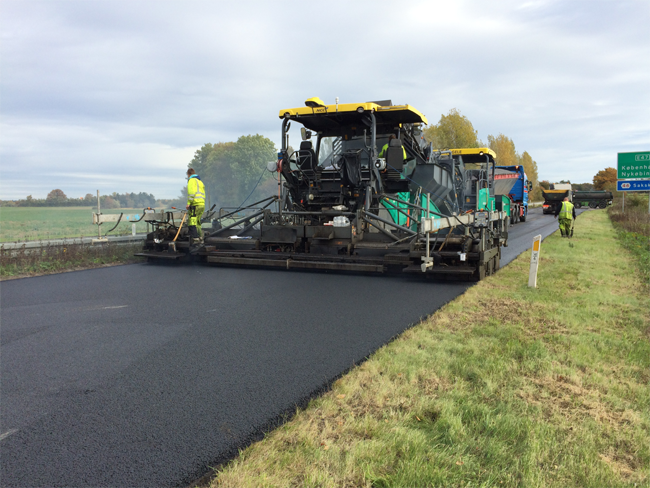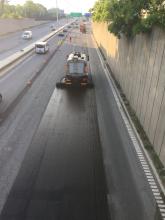
Recent advances in road construction have included the development of climate asphalt, which reduces rolling resistance and saves CO2. But what is it and how does it affect the production and use of asphalt pavements? And what are the socio-economic implications? The ROSE project that just ended with a workshop in Copenhagen might hold the answers.
The rule of thumb is that low rolling resistance delivers low energy consumption.
A car uses about 25% of its energy to overcome rolling resistance. The ROSE project has developed a new type of asphalt pavements, aiming to reduce rolling resistance with 5%, compared to traditional asphalt types. A 4% reduction in Denmark alone would provide yearly reductions of 60 million litres of fuel, equal to 140,000tonnes of CO2.
Workshop participants included researchers, producers, road administrations and public entities - all a part of the successful outcome of the ROSE project. Head of Section, Rose Maria Laden Holdt from the Danish Ministry of Energy, Utilities and Climate presented the Danish Air and Climate Plan "Together for a greener future", which introduces climate asphalt as a key point. "By 2020, the government will roll out climate asphalt on all national roads, which are to be renewed anyway," she said. Denmark is focused on reaching its EU climate goals by 2030 and to reach net zero emissions by 2050.
The ROSE project is standing on the shoulders of several projects about rolling resistance. Going back almost 10 years, Bjarne Schmidt from the
At the workshop, Ulf Sandberg from the Swedish Road Transport Institute, VTI, went over the results of MIRIAM, as well as the corresponding projects, ROSANNE and COOEE. "The projects succeeded in finding correlations between texture and rolling resistance and the functions we are looking for, such as friction, durability and tyre wear, and we have pointed out a series of good candidates for climate asphalt," Sandberg said.
Christian Axelsen from the Danish road Directorate is an expert on the socio-economic impacts of implementing low rolling resistance pavements. He explained, "Today, the transport sector is required by the European Commission to contribute to the reduction of CO2 emissions. The demand for the implementation of more energy-efficient means to reduce carbon and particle emissions is increasing roads are now in a position to contribute to this in a significant way. Now, with the implementation of low rolling resistance pavements, numerous stakeholders will benefit, from the single road user, to commercial use of roads, to the health sector, and more. The main benefits of the energy-efficient pavement are lowered fuel consumptions, particle emissions and, as an added bonus, a reduction in noise emission. We have accurate models to describe the implications of noise reducing asphalt, including traffic numbers, noise and pricing. When applying rolling resistance to the model, a very clear positive effect can be seen, especially when comparing to other CO2 reducing solutions."
Innovating in a known and proven field like asphalt materials, takes a lot of basic research and development. Luckily, ROSE has been able to draw on the experience and effort from all sides of the business. At the workshop, advanced mathematical models, new test methods and high-tech measuring equipment were presented by some of the hard-working people behind the scenes.
Morten Lau Larsen and Tina Hecksher from from Roskilde University have established a laboratory to measure rolling resistance and to investigate the correlation between texture and rolling resistance.
Jesper Schmidt Hansen, also from Roskilde University presented the ROSE bitumen model, which describes mechanistic circumstances on a micro level and can help predict the durability of the asphalt product.
Matteo Pettinari from the Danish Road Directorate told about the ongoing implementation of the asphalt in Denmark.
Julien Cesbron from IFSTTAR, talked on the subject of using a visco-elastic model to validate rolling resistance tests.
Natasja R Nielsen, PhD student from Roskilde University presented on how to measure rolling resistance in regards to heavy vehicles with the high-speed deflectograph, developed by Greenwood Engineering.
During the work with developing the new asphalt, international contribution has been important, as an international need and demand for the product is expected. ROSE has benefited greatly from working with both the French research institute, IFSTAAR and the German tyre producer, Continental. And as Secretary General of FEHRL (Forum of European Highway Research Laboratories), Dr Thierry Goger made clear, CO2 reduction truly is an international issue and priority.
In order to succeed in funding transportation projects, Dr Goger suggests a step-wise process. The first stage is to raise awareness of the project during the initial stages to secure positive engagement from relevant stakeholders. Next, it is vital to strengthen the link between the project and the broader technical/scientific community. And it is necessary to ensure that the activities of the project are disseminated to a wide community, including policymakers and the wider public. Finally, it is important to promote the outreach, knowledge transfer and implementation of the project results. Also, the project should of course support the overall cluster (climate, energy, mobility).
In addition, Thierry Goger pointed out that investment plans and tenders should follow implementation and that rolling resistance could be worked into asset management requirements and systems.
The first few km of climate asphalt were laid out in test sections in 2012-14 and has since been followed by a highly profiled section on the Elsinore motorway and three further and longer sections. All in all, about 40km have been laid out with the material. Bjarne Bo Jensen from the asphalt company, NCC, has been in charge of a full-scale production and layout on the M30 motorway, also in Denmark. It is now clear that it is possible to create a satisfactory quality of asphalt which meets the many new technical requirements.
The workshop ended with a very interesting panel discussion, moderated by Peter Kjær, deputy principal of Roskilde University and chairman of the ROSE steering group.
Thierry Goger brought up the subject of Big Data, where road asset management that includes rolling resistance could be introduced to a European city, like Copenhagen, to act as a test bed for implementation.
Gert Ahé, director of technology, Danish Road Directorate, reminded the participants of how understanding, trust and dedication between all parties in the business is key to international implementation of climate asphalt. "We have now rolled out the product on four major stretches of roads and we still need more laboratory tests and measurements to verify results - but it is looking good," he said.
A vital part of the success behind ROSE has been joint collaboration. As road infrastructure is an integral part of modern society, so are the many participants, representing all links of the chain.
"I am thrilled that we have succeeded," said project manager of ROSE, Dr. Jeppe Dyre, Roskilde University. "We have moved from a small test section on 1km to 40km of working asphalt and we are looking at plans for 4,000km more in Denmark alone," he said. He went on to thank all parties involved, including the Danish Innovation Fund and former projects on rolling resistance, and gave special thanks to project coordinator Jesper Kampmann Larsen.








